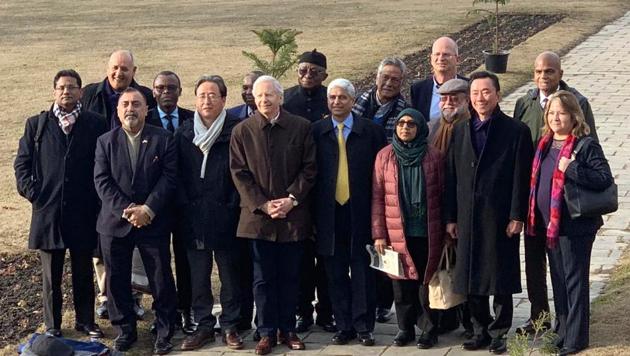70 trips in 1 year: Govt may have followed China model in arranging foreign envoys’ J-K visit
China has organised similar tours – as many as 70 since December 2018 -- -- in the far-flung northwestern province of Xinjiang.
India seems to have lifted a page from China’s playbook on diplomacy in Xinjiang proving by arranging the visit of 15 New Delhi-based envoys to Kashmir, the first such visit by foreign diplomats following the revocation of Jammu & Kashmir’s special status last August.

China has organised similar tours – as many as 70 since December 2018 -- -- in the far-flung northwestern province of Xinjiang where more than a million Muslim minorities have been interred in high-security camps or, as per Beijing, in vocational training institutes for livelihood training and preemptive deradicalisation.
Beijing admitted the existence of the camps in October 2018 after facing sharp media and international criticism over months for cracking down on minorities, a majority of them from the Turkic Uyghur community.
ALSO WATCH | Indian govt clarifies on absence of EU envoys in delegation visiting J&K
By the end of December that year, the Chinese ministry of foreign affairs had organised the first chaperoned tour to Xinjiang for 12 Beijing-based diplomats including one from India.
The Chinese foreign ministry told HT on Thursday that so far – since the first tour in December 2018 – Beijing has organised 70 similarly guided tours, expanding the profile of participants from China-based diplomats to officials from international organisations, foreign journalists and scholars from abroad.
“Since the end of 2018, more than 70 groups of foreign delegations including from the international organisations, foreign government officials, envoys to China, media, scholars and so on have visited Xinjiang,” the Chinese ministry of foreign affairs told HT in a written Chinese statement.
The objective: To show the world how China’s policies had brought peace and prosperity to the province on the frontline of Beijing’s fight against terrorism, extremism and separatism; to advertise that the camps aren’t centres for brainwashing but an example of government policy bringing hundreds of thousands of misguided minorities into the mainstream.
The visits have also been criticised as choreographed and as an effort to propagate Beijing’s narrative that there’s no crackdown on minorities in the border province.
“They (the groups) witnessed the good situation of Xinjiang’s stable and prosperous development and praised Xinjiang’s experience in anti-terrorism and deradicalisation work as worthy of learning and drawing lessons from,” the foreign ministry said.
“China welcomes foreign people who hold an objective and impartial position to visit Xinjiang but will never allow external forces to interfere in China’s internal affairs by visiting Xinjiang or taking advantage of Xinjiang-related issues,” the statement said.
The ministry didn’t share details but the Communist Party of China (CPC)-led country has evidently spent a huge sum of money to sponsor tours – the groups are large, many of them flown in from other countries, the tours are generally last for three to five days and the touring members are well looked after.
“It is a good model; seeing means believing. China can do. India can follow especially under such circumstances of the dominance by the western media and culture,” Feng Qian from the National Strategy Institute of the Beijing-based Tsinghua University said.
The objective is to show a “…clearer picture and also the Narendra Modi-government’s confidence,” Feng added.
“I think it is very interesting that India is doing something like China has done in Xinjiang. There are some similarities ...in this kind of plan to organise foreign envoys, diplomats to Kashmir. This must be very helpful for Indians to ease the pressure from the international community. To some extent, it can ease some pressure and suspicion about Indian actions in Kashmir,” Long Xingchun, director of the Centre for Indian Studies at the China West Normal University in Sichuan said.
For Liu Zongyi from the Shanghai Institutes of International Studies, it is important for China to organise tours for diplomats to Xinjiang.
“The western countries treat India and China differently on Kashmir and Xinjiang issues. As we know, the western countries criticise China on the Xinjiang issue very much but do not criticise India on Kashmir,” Liu said.






